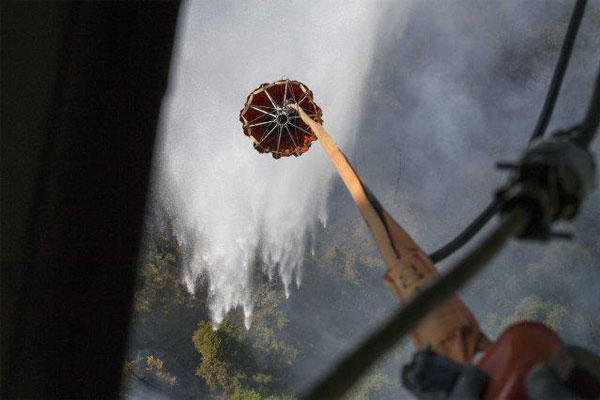JOINT BASE ELMENDORF-RICHARDSON, Alaska -- Alaska Army National Guard UH-60 Black Hawk helicopters and aircrews, from the 1st Battalion, 207th Aviation Regiment, or 1-207th AVN, continue to conduct water bucket drops in support of recent wildfire suppression efforts in Alaska.
"We've flown more than 36 hours, dropped 365 buckets and dispensed 254,500 gallons of water since Sunday," said Lt. Col. Robert Kurtz, the Alaska Army National Guard state aviation officer.
The 1-207th AVN accepted its first mission to support wildfire suppression efforts, June 14, around 5 p.m., and service members were in the air within two hours, headed toward Willow's Sockeye Fire.
The helicopters and aircrew were transferred from the Sockeye effort, June 17, and asked to perform operations on the Kenai Peninsula after several spot fires began due to lightning strikes the prior evening.
Due to the location and terrain, the Black Hawks were able to reach areas that ground crews could not access, and the goal was to begin suppressing the fire as quickly as possible to prevent it from spreading.
"We were 'initial attack' for the Stetson Creek Fire," Kurtz said. "Our aircrews had to determine where to drop water, and we were solely responsible out there during the initial effort."
The Stetson Creek Fire is located about 1.5 miles south of the Sterling Highway, between Russian River and Cooper Creek, according to the Incident Information System website.
The Black Hawks and crews flew 16 flight hours on June 10, in steep, mountainous terrain, with the fire encroaching on valuable, but dangerous power lines. They continued the effort, June 11, in the same area, where the fire had grown to 400 acres.
"We were released early yesterday by incident command, awaiting a re-mission while they reassess the appropriate assets require for all current fires," Kurtz said.
Crews will be on stand-by through the weekend and into next week, and will provide support as needed.
"We anticipate being tasked for Card Street or Stetson, but could be asked to go anywhere in the state," Kurtz said. "We will respond as necessary to help however we can."
Two pilots and one crew chief operated each helicopter, June 17. The 1-207th currently has 11 qualified crews, who must be swapped out every three to four days.



























